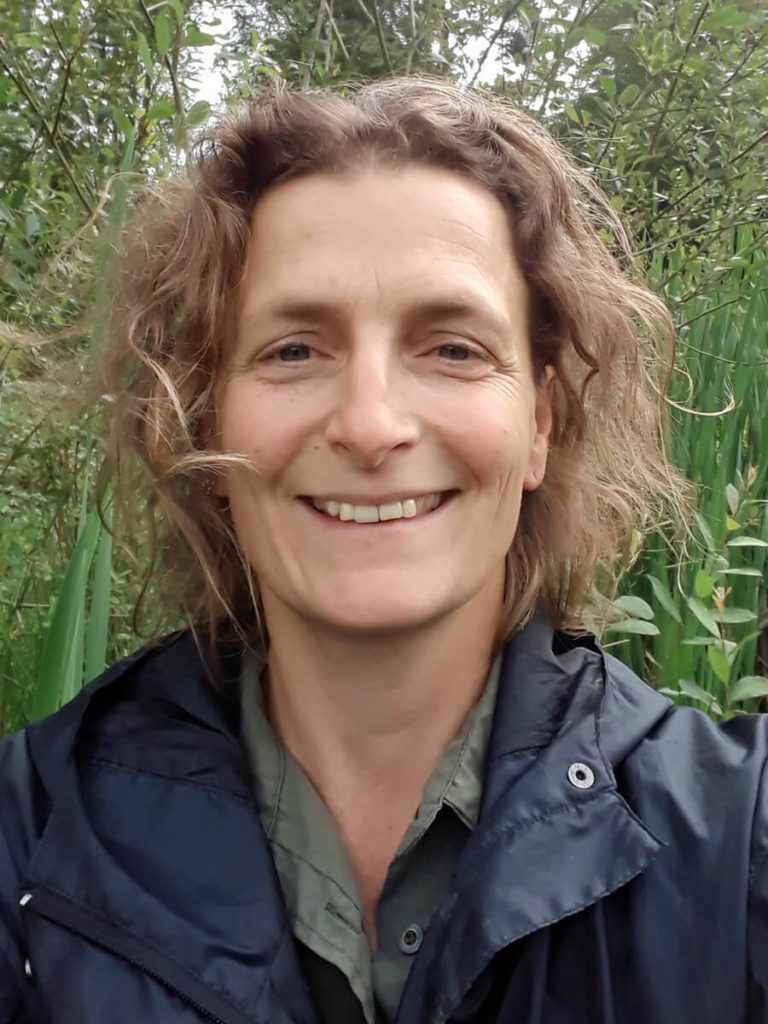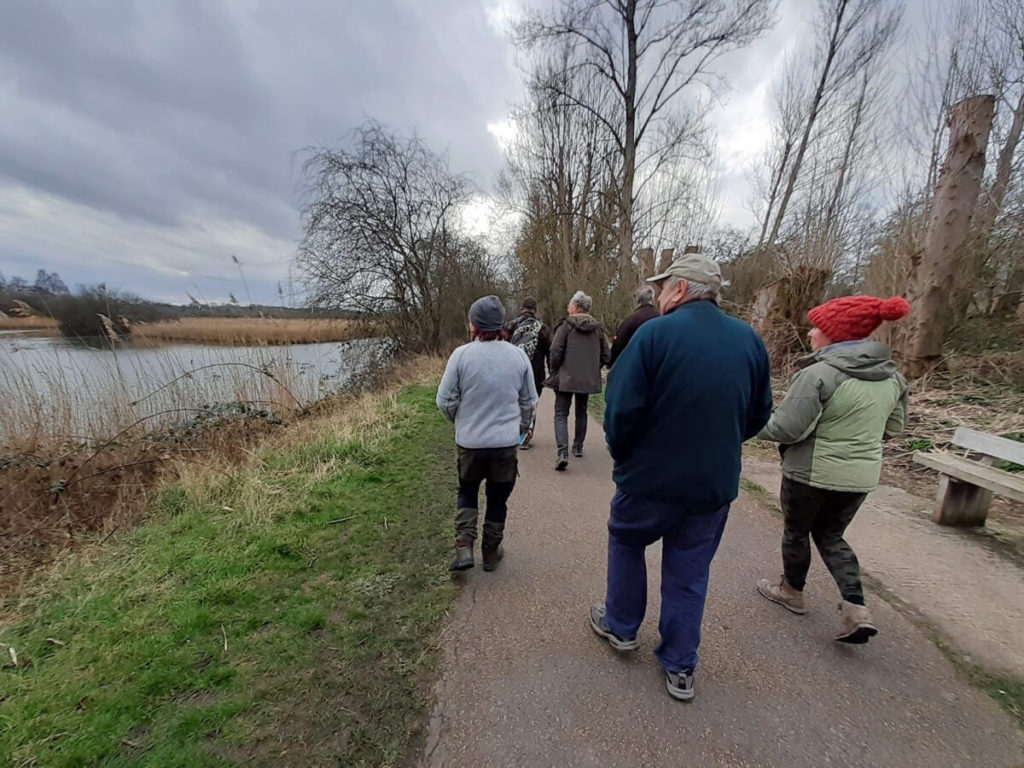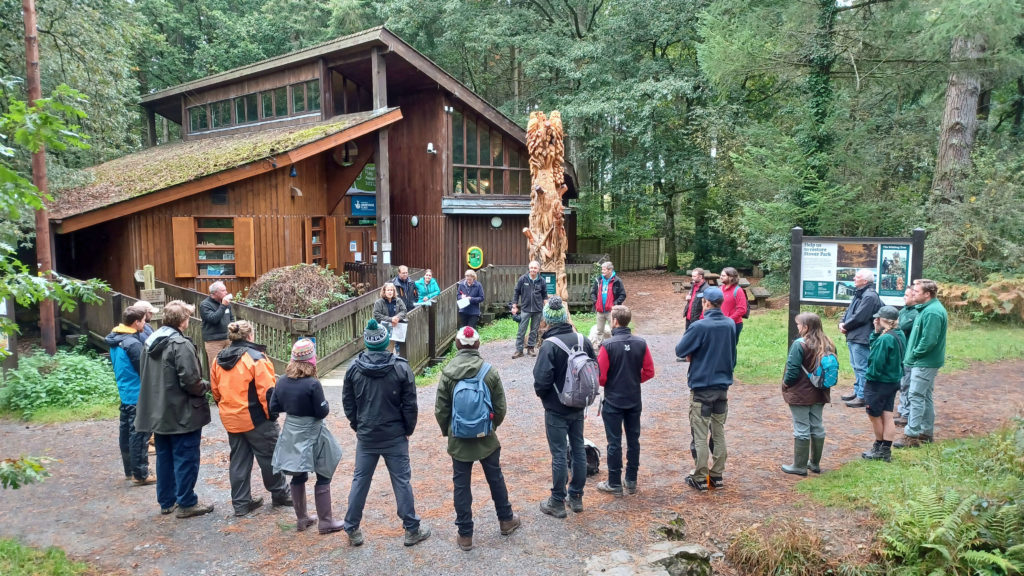🇬🇧 🇩🇪 We continue our series on national ranger associations with the UK Countryside Management Association (CMA). Chloe Bradbrooke works for National Trust as a senior ranger in West Sussex and, as international coordinator for the CMA, reports on the topics and learnings from the first England-wide conference after the pandemic.
Chloe, you joined the first on-site-national conference of the british rangers since covid recently. Which topics were on your agenda?
The title of our conference was “Reconnect, Reflect and Respond”. The last couple of years there has been a great disconnection with all the issues changing the world that we work in, influencing society, economy and environment: covid, climate change, brexit, biodiversity loss, just to name a few. So our goal was to reconnect with friends and colleagues, reflecting on our experiences of the last few years and to share lessons on the best ways to respond. We started with on-site meetings in the regions prior to the conference. People were encouraged to meet face-to-face again to reconnect. At our first day of the conference we discussed the outcomes of those meetings.

“Many of us felt like we have been fighting on all fronts recently. So reconnecting really helped remind us why we are in this fantastic profession as rangers.”
Chloe Bradbrooke, International Coordinator at CMA
They mainly helped as a reminder about why we do what we do and how good it is. For a lot of colleagues it has been so tough recently, that it was kind of necessary to remind ourselves of the fantastic profession that we are all in. But we also talked about topics like visitor management or addressing the nature crisis by working at landscape scale and developing new skills. Concerning climate change, we discussed electric equipment and moving away from diesel and petrol as well as equipment difficulties. Another big subject was, how we get proper recognition for our profession and a lot work has gone into developing professional accreditation, formalising the experience people already have. To help rangers achieve this we also discussed ways to fill in training gaps, especially where there have been so many budget cuts on training. So the question was, if the Countryside Management Association (CMA) could fill in those gaps.
“If people care for nature, they want to protect it.”
Chloe Bradbrooke on opportunities through increased visitor numbers
What solutions did you come up with for these questions?
The association will provide again free study days, which have been halted during covid. The CMA has also formed a working group to address the training issues. Overall, we came up with a lot of learning points. But above all the meeting helped all of us to keep motivation, because it feels that we are fighting on all sorts of fronts. One of them was that we had a lot of damage in the countryside. During covid many people were coming, who never have been there before and so maybe didn’t quite know how to behave. We had issues with litter, trampling, dogs. At the same time it was great that people wanted to come out. And colleagues reported new ways to manage like audio tours for visitors or addressing them via social media. But it was a challenge to do that with less staff at that time. Colleagues lost their jobs and many of them found a job elsewhere. A lot of the rangers in England work for NGOs with less stable funding than state’s departments.

Have you discussed any new developments that could improve the situation?
There is a new appetite now for caring about subjects like climate change and biodiversity loss. And we observe a government-backed big ambition for the sake of planting trees and other goals concerning conservation. A lot of them are vital in everyone’s attention now. That is really a great opportunity, because we see more funding for green issues. There is the idea that people don’t care for what they don’t understand or experience. So the trend to get out and realize what nature is about is vital for the young generation. And finally, this new awareness helps us to do our work out there.

This content is sponsored by
“Der Besucherandrang ist so fordernd wie wichtig für den Naturschutz”
Wir setzen unsere Serie zu den nationalen Rangerverbänden mit der britischen Countryside Management Association (CMA) fort. Chloe Bradbrooke arbeitet bei National Trust als leitende Rangerin in West Sussex und berichtet als internationale Koordination für die CMA über die Themen und Learnings der ersten englandweiten Konferenz nach der Pandemie.
Chloe, Du warst bei der der ersten Vor-Ort- Konferenz der britischen Ranger seit Covid dabei. Welche Themen standen auf Eurer Agenda?
Der Titel unserer Konferenz lautete “Reconnect, Reflect and Respond”. In den letzten Jahren gab viele Themen, die die Welt, in der wir arbeiten, verändern, Verbindungen unterbrechen und die Gesellschaft, Wirtschaft und Umwelt beeinflussen: Covid, Klimawandel, Brexit, Verlust der biologischen Vielfalt, um nur einige zu nennen. Unser Ziel war es also, mit Freunden und Kollegen zusammenzukommen, die Erfahrungen der letzten Jahre zu reflektieren und Lehren zu ziehen. Wir begannen mit Treffen vor Ort in den Regionen, die der Konferenz vorausgingen. Die Teilnehmer wurden ermutigt, sich persönlich zu treffen, um Kontakte zu knüpfen und wiederzubeleben. Am ersten Konferenztag haben wir die Ergebnisse dieser Treffen besprochen.
“Viele hatten zuletzt das Gefühl, an allen möglichen Fronten zu kämpfen. Das Wiedersehen hat uns daran erinnert, warum wir diesen phantastischen Beruf als Ranger ausüben.”
Chloe Bradbrooke, International Coordinator bei CMA
Vor allem haben sie uns daran erinnert, warum wir tun, was wir tun, und wie gut es ist. Für viele Kolleginnen und Kollegen war es in letzter Zeit so schwierig, dass es wichtig war, uns an den phantastischen Beruf zu erinnern, den wir alle ausüben. Aber wir haben auch über Themen wie Besuchermanagement oder die Bewältigung der Klimakrise durch unsere Arbeit vor Ort und die Entwicklung neuer Skills gesprochen. In Bezug auf den Klimawandel haben wir elektrische Geräte und die Abkehr von Diesel und Benzin sowie über Schwierigkeiten bei der Ausrüstung gesprochen. Ein weiteres großes Thema war die Anerkennung unseres Berufs und die Frage, wir wir Ausbildungslücken schließen. Vieles hat mit der Formalisierung der Erfahrung zu tun, die die Leute bereits haben. Auf der anderen Seite gab es viele Budgetkürzungen in der Weiterbildung. Die Frage war also, ob die Countryside Management Association (CMA) diese Lücken füllen kann.
Welche Lösungen habt Ihr für diese Fragen gefunden?
Der Verband wird wieder kostenlose Studientage anbieten, die während Covid unterbrochen wurden. Die CMA hat auch eine Arbeitsgruppe gebildet, die sich mit Bildungsfragen befasst. Insgesamt haben wir eine Menge gelernt. Vor allem aber hat das Treffen uns allen geholfen, die Motivation zu bewahren, denn wir haben das Gefühl, dass wir an allen möglichen Fronten kämpfen. Zum Beispiel hatten wir viele Schäden, als in der Pandemie viele Besucher kamen, die vorher noch nie in den Schutzgebieten waren und manchmal nicht wussten, wie sie sich verhalten sollten. Wir hatten Probleme mit Müll, Wandern abseits der Wege und auch mit Hunden. Gleichzeitig war es toll, dass die Leute kommen wollten. Und viele von uns haben neue Wege wie Audioführungen oder Social Media-Formate gefunden, um die vielen neuen Besucher zu erreichen. Dennoch war es eine Herausforderung, da wir auch mit weniger Personal auskommen mussten. Viele haben ihre Arbeit verloren und anderswo einen Job gefunden. Die meisten Ranger*innen in England arbeiten für Nichtregierungsorganisationen, deren Finanzierung weniger stabil ist als die der staatlichen Behörden.
Habt Ihr auch Entwicklungen beobachtet, die die Situation verbessern könnten?
Das Interesse an Themen wie Klimawandel und Verlust der Artenvielfalt ist neu entfacht. Und wir beobachten, dass die Regierung große Anstrengungen unternimmt, um Bäume zu pflanzen und andere Naturschutzziele zu erreichen. Viele dieser Ziele sind für jeden von uns entscheidend. Das ist wirklich eine große Chance, denn wir sehen mehr Mittel für grüne Themen. Wenn Menschen sich nicht für etwas interessieren, das sie nicht verstehen oder erleben, ist der Trend, sich über die Natur zu informieren und sie kennenzulernen, besonders für die junge Generation wichtig. Und und hilft dieses neue Bewusstsein, unsere Arbeit dort draußen zu tun.

